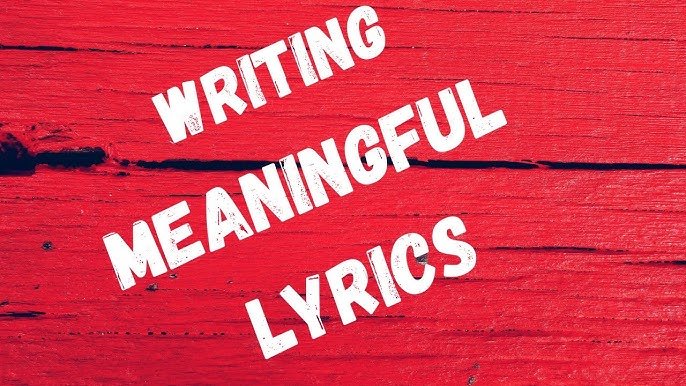The Art of Writing Meaningful Song Lyrics
Songwriting is an art form that combines poetry, storytelling, and music, but the real magic happens when the lyrics resonate deeply with listeners. Meaningful song lyrics go beyond surface-level phrases and chords; they speak to universal experiences, emotions, and stories that listeners can relate to on a personal level. Whether you’re an aspiring songwriter or an experienced musician looking to hone your craft, writing lyrics that evoke emotions and leave a lasting impact requires both creativity and intention.
In this post, we’ll explore the essential steps and techniques to help you write meaningful song lyrics that connect with your audience.
1. Start with a Concept or Emotion
Every meaningful song begins with an idea or emotion you want to convey. Before writing your lyrics, take a moment to reflect on the message or feeling you want to communicate. Is it love, heartbreak, joy, or social change? The more specific and focused your concept is, the more impactful your lyrics will be.
- Identify the Core Emotion: Whether it’s the intense rush of love or the sadness of losing someone, identify the core emotion you wish to evoke in your song. This emotion will serve as the foundation for the rest of your lyrics.
- Be Specific: Rather than speaking in broad, generic terms, try to capture specific moments or details that represent that emotion. This makes the song more relatable and authentic.
Example Insight: Adele’s Someone Like You is a perfect example of how a specific emotion (heartbreak) can be the driving force behind the lyrics. Her detailed, personal perspective makes the song feel universal, even though it’s rooted in her own experience.
2. Use Storytelling Techniques
Great lyrics often tell a story. Storytelling in songwriting allows listeners to connect with the song by visualizing scenes or scenarios, making the lyrics feel personal and immersive. To create an effective story within your lyrics, keep the following in mind:
- Establish a Narrative Arc: Just like in a novel or short story, a song should have a clear beginning, middle, and end. Introduce the situation, build tension or emotion, and then resolve it or leave it open-ended for the listener to interpret.
- Develop Characters: Create relatable characters in your song. These could be real people or fictional figures, but giving them depth and detail will help listeners form an emotional connection with them.

Example Insight: Bruce Springsteen’s The River masterfully uses storytelling to depict the struggles of a working-class couple. The song’s narrative structure and characters make the song feel like an emotional journey, and the lyrics stick with the listener long after the music ends.
3. Be Vulnerable and Authentic
One of the most powerful ways to write meaningful lyrics is to be honest with yourself and your listeners. Vulnerability in songwriting allows you to express your true emotions without fear of judgment. The more raw and authentic your lyrics are, the more listeners will be able to connect with them on a personal level.
- Embrace Imperfection: You don’t have to have it all figured out when writing your lyrics. In fact, embracing the complexities and contradictions of life can make your song feel more real and grounded.
- Personal Experience: Many iconic songs come from an artist’s personal experiences. Writing about what you know can help you craft lyrics that feel genuine and sincere.
Example Insight: In Hurt, Johnny Cash’s cover of Nine Inch Nails’ song, his raw, emotional delivery and personal reflection on life and regret transform the song into a powerful narrative of self-awareness and vulnerability.
4. Play with Language and Imagery
The power of lyrics lies in how language is used. Strong, evocative imagery can transport the listener into a different world, making them feel the emotion you are trying to convey. Instead of telling your audience exactly how you feel, show them through poetic language and metaphor.
- Use Metaphors and Similes: Metaphors and similes can help elevate your lyrics by making them more vivid and imaginative. Instead of saying “I’m sad,” you could write “My heart is a storm that won’t settle.” This creates a more impactful image that resonates with the listener.
- Use Descriptive Language: Painting a picture with words allows your listeners to visualize the scenes and emotions in your song. The more detail you provide, the more your audience can relate.
Example Insight: Bob Dylan is renowned for his lyrical imagery. In Blowin’ in the Wind, his use of metaphor and poetic language creates a song that speaks to social justice, leaving much of its meaning open to interpretation but deeply powerful nonetheless.
5. Find the Right Song Structure
A strong song structure is key to making your lyrics memorable. While there are no hard rules about how to write a song, certain structures are more common and effective in keeping the song engaging.
- Verses and Chorus: Most songs follow a structure of verses, choruses, and a bridge. The verses set the scene, the chorus delivers the main emotional message or hook, and the bridge provides a musical or emotional shift. Ensure your lyrics flow naturally within these sections.
- Repetition for Impact: The chorus is often the most memorable part of the song, so use this section to repeat your main message or emotional theme. Repetition helps cement your song in the listener’s mind.
Example Insight: In Katy Perry’s Roar, the chorus is the emotional center of the song, providing an empowering message of strength and resilience. The repetition of “I am a champion” makes the song catchy while reinforcing its message.
6. Edit and Revise
Great song lyrics are often the result of multiple rounds of editing. Once you have your initial draft, step back and evaluate your lyrics. Are they as clear, emotional, and impactful as they could be? Are there any words or lines that feel forced or out of place? Refining your lyrics is an essential part of the songwriting process.
- Be Ruthless with Editing: Don’t be afraid to cut lines that aren’t working or restructure verses for better flow.
- Seek Feedback: Sometimes it helps to get input from other songwriters or trusted listeners. Fresh ears can offer valuable insight that helps improve your lyrics.
Example Insight: Leonard Cohen, known for his poetic lyrics, was famously meticulous about his songwriting. His dedication to revising and fine-tuning his lyrics led to the creation of timeless classics like Hallelujah.
Conclusion
Writing meaningful song lyrics is a skill that requires practice, patience, and creativity. By starting with an authentic emotional core, using storytelling techniques, embracing vulnerability, and playing with language and imagery, you can create lyrics that resonate deeply with your audience. Remember, the most powerful songs are the ones that reflect true human emotions and experiences, allowing listeners to see themselves in the music and feel a deep connection to the words. Whether you’re writing a love song, a social anthem, or a personal reflection, the art of crafting meaningful song lyrics is one of the most powerful ways to express yourself through music.


